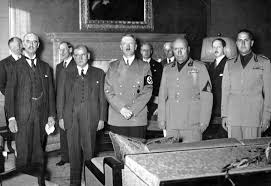 |
| 1938 Munich Agreement |
This war has been going on for three years now and has caused much death and suffering in the area. In spite of overwhelming odds, the Ukraine has been holding off the Russian onslaught, with the help of the US and European Union. However, since the election of Donald Trump as president of the United States, things have taken a worrying turn.
President Trump has stated that he wants to end the war and be the big peacemaker. First, I don't fault him for wanting to put an end to this war. However, I object to how he is going about it and the main way is to ignore history. See, Trump wants Russia to keep the territory it originally captured in a 2013 invasion and is hinting that Russia keep the territory it has captured in its 2022 invasion of Ukraine.
Trump and Russian president, Vladimir Putin, have been having unilateral talks without Ukraine being president. Here's where history is being ignored. Back in 1938, Great Britain and France, without inviting Czechoslovakia, agreed to give Adolph Hitler a piece of Czech territory known as the Sudetenland. British Prime Minister, Neville Chamberlain, came back waving a peace of paper saying we have peace in our time. As we all know, this only encouraged Hitler further and a year later, the world was plunged into its second world war.This is why it is imperative that Ukraine be included in any peace talks between the US and Russia.
My question here is: Does Trump think that allowing Putin to keep captured territory, especially when international law does not recognize the acquisition of territory through military conquest, will establish peace in the region? What is worse is that the president is trying to make Volodymyr Zelensky, Ukraine's president, out to be the bad guy. He calls Zelensky a dictator who started the war. He and his followers seem to forget that Russia invaded Ukraine, not the other way around. Zelensky was democratically elected and only suspended elections on account of the war. The very same thing Winston Churchill did in World War 2. On the flip side, the US had a presidential election in 1944, which is great for democracy but it resulted in no major operations in the month before the election and could have been the cause as to why Germany was allowed to regroup and plan and carry out a counter attack in the December known now as The Battle of the Bulge. On the other hand, Russia's elections are a sham. Anyone who opposes or even speaks out against Putin is arrested. So, I ask, who's the real dictator?





